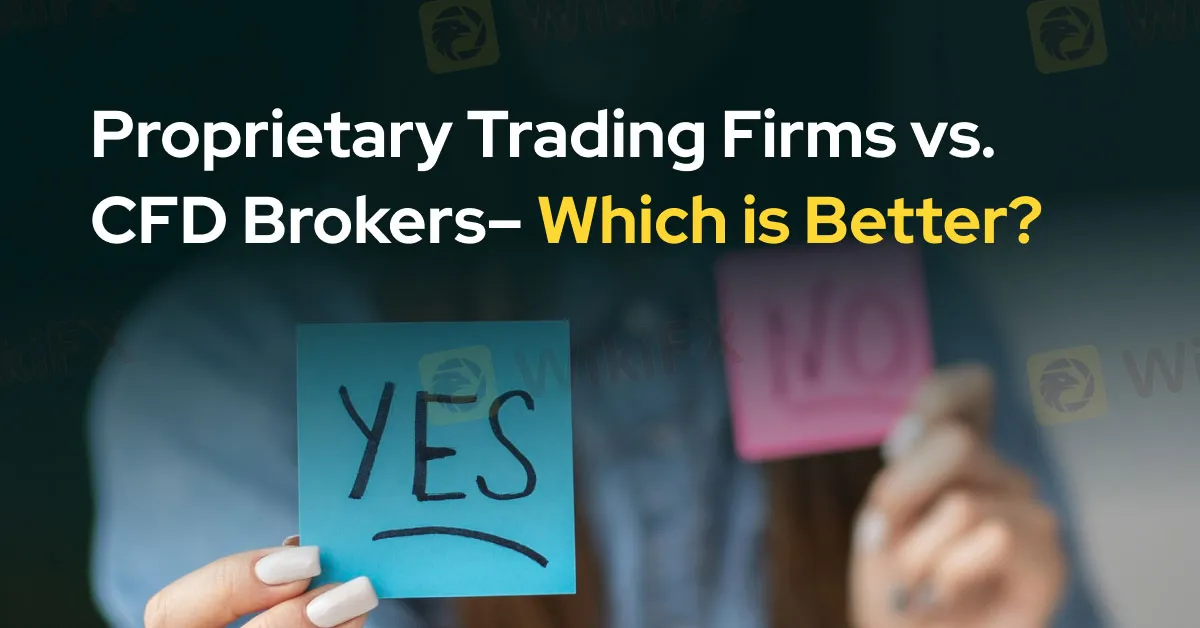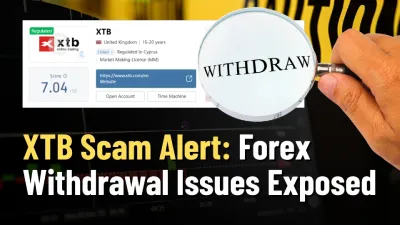HFM Scam Warning: Withdrawal Complaints Surge
HFM users report withdrawal delays and missing funds. Read verified scam complaints, check regulatory info, and report your HFM case now.
简体中文
繁體中文
English
Pусский
日本語
ภาษาไทย
Tiếng Việt
Bahasa Indonesia
Español
हिन्दी
Filippiiniläinen
Français
Deutsch
Português
Türkçe
한국어
العربية
Abstract:In online trading, proprietary trading firms and CFD brokers represent two prominent models, each offering distinct opportunities and facing unique challenges. Understanding their differences can aid traders in making informed decisions about their trading strategies and investments.

In online trading, proprietary trading firms and CFD brokers represent two prominent models, each offering distinct opportunities and facing unique challenges. Understanding their differences can aid traders in making informed decisions about their trading strategies and investments.

Proprietary trading firms, often called “prop firms,” trade assets using their own capital. Traders at these firms use sophisticated strategies to generate profits, with a share of the profits going to the traders. One key advantage is that traders do not need to invest their own money, which mitigates personal financial risk. These firms provide capital, allowing traders to focus solely on their strategies without worrying about potential losses of their own funds.
Proprietary trading firms offer access to advanced trading platforms, research, and tools that might be otherwise costly or inaccessible. This professional environment can significantly enhance a trader's performance and growth. Additionally, successful traders can earn substantial financial rewards through profit-sharing agreements. Many prop firms also offer extensive training programs and mentorship, making them an attractive option for novice traders looking to develop their skills with professional guidance.
However, there are downsides. A significant portion of the profits is retained by the firm, meaning traders do not keep all the profits they generate. The high-pressure environment can lead to intense performance expectations, and stringent risk management rules can limit a traders freedom to implement their strategies fully. Job security can also be a concern, as underperformance can lead to quick termination in this high-stakes setting.

CFD (Contract for Difference) brokers allow traders to speculate on the price movements of various financial instruments without owning the underlying assets. CFDs are derivatives that let traders go long or short on markets such as stocks, indices, commodities, and forex.
CFD brokers typically offer high leverage, enabling traders to control large positions with a relatively small capital outlay. This leverage can amplify profits but also increases the risk of significant losses. CFD trading provides access to a broad range of markets and instruments, allowing for diversification and strategic responses to different market conditions. Traders can speculate on both rising and falling markets, and avoid the complexities associated with owning actual assets, such as storage or settlement issues.
Despite these advantages, CFD trading comes with risks. The leverage that enhances profit potential can also magnify losses, making risk management crucial. Additionally, the costs associated with CFD trading, including spreads, commissions, and overnight fees, can erode profits. Some CFD brokers operate as market makers, taking the opposite side of their clients' trades, which can create conflicts of interest. The regulatory environment for CFD trading varies by jurisdiction, affecting the safety and reliability of CFD brokers.

Choosing between proprietary trading firms and CFD brokers depends on individual goals, experience levels, and risk tolerance. Proprietary trading firms are suitable for those who prefer to trade without risking personal capital and value a structured, professional environment with potential for significant financial rewards and professional growth. Conversely, CFD brokers cater to traders with a higher risk appetite who are comfortable with leverage and seek flexibility in speculating on various markets.
In summary, both proprietary trading firms and CFD brokers offer unique benefits and challenges. Prop firms provide a professional setup with reduced personal financial risk but involve high pressure and profit-sharing constraints. CFD brokers offer flexibility and high leverage but come with significant risk and potential conflicts of interest. Understanding these dynamics is essential for making an informed decision in the competitive realm of online trading.

Disclaimer:
The views in this article only represent the author's personal views, and do not constitute investment advice on this platform. This platform does not guarantee the accuracy, completeness and timeliness of the information in the article, and will not be liable for any loss caused by the use of or reliance on the information in the article.

HFM users report withdrawal delays and missing funds. Read verified scam complaints, check regulatory info, and report your HFM case now.

ThinkMarkets faces fraud allegations in Hong Kong. Traders report blocked withdrawals and seized funds. Check the full exposure now.

XTB traders worldwide report missing withdrawals and delayed payouts. Check out the verified complaints and stay protected.

WikiFX Elite Club Focus is a monthly publication specially created by the WikiFX Club for its members. It highlights the key individuals, perspectives, and actions that are truly driving the forex industry toward greater transparency, professionalism, and sustainable development.
